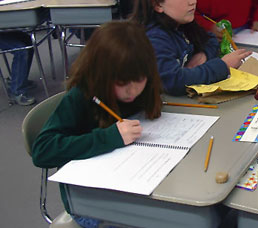Why use Science Notebooks?

Writing is an essential part of science inquiry. Just as scientists keep written records of their investigations, in the classroom students keep chronological records of their investigations. Notebook entries tell the story of an investigation. The story begins with an investigation question and may include predictions, procedures, data represented in a variety of ways, analyses and conclusions. The story would be incomplete without the inclusion of ideas, wonderings, and questions — the notebook is the place for students to reflect throughout an investigation, creating a record of their developing ideas and questions.
Notebook skills need to be taught explicitly, modeled, and practiced over time with the goal of students using notebooks independently. Initially, the teacher takes responsibility for writing and structuring notebook entries, gradually releasing responsibility to students as they are ready. Writing about their science experiences and ideas, students put their developing literacy skills to use in an authentic context.
Here are some strategies for making productive use of science notebooks.- Make sure students have their notebooks with them whenever they do science
- Plan time for students to write in their notebooks
- Make sure each entry is dated, arranged chronologically, and includes a descriptive heading
- Provide opportunities for students to record ideas, questions, and reflection on their learning in addition to a record of the investigations
- Find opportunities for authentic uses of notebooks throughout an investigation, e.g., students refer to their data during discussions
- Check notebooks regularly for formative assessment purposes, adjust your teaching accordingly
- Provide feedback on notebook entries through short written comments and/or questions several times during an science unit
- Emphasize clear communication; do not emphasize correct spelling, punctuation, and grammar



